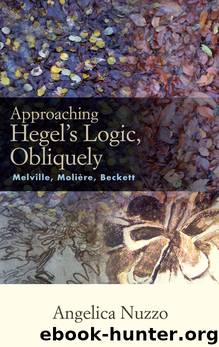Approaching Hegel's Logic, Obliquely by Angelica Nuzzo

Author:Angelica Nuzzo [Nuzzo, Angelica]
Language: eng
Format: epub
ISBN: 9781438472058
Publisher: State University of New York Press
Published: 2018-01-15T07:00:00+00:00
2.2. The Logic of Fanaticism: Advancing Despite Oneself—The Hypocrisy of Essence
We have seen how moral conscience advances between the two apparently identical positions of refusing to give determinacy to the form of duty, and of dissolving into itself—or bringing to “evaporation” (verflüchtigt) in the depths of its inwardness—“all determinateness of right, duty, and existence.” In the latter case, on the basis of an “absolute reflection” (R §138 Remark), conscience proclaims itself “the judging power” (die urteilende Macht) (R §139) uniquely positioned to decide which “contents” can be accepted as true and morally valid, ultimately, however, implying the “vanity” (Eitelkeit) of all contents on the basis of their utter arbitrariness. What we have here is the point in which Orgon’s naïve absolutism connects with Tartuffe’s hypocrisy. The line separating the good and the evil conscience, intransigent absolutism and radical relativism, the self-appointed righteousness of moral interiority and the reflected duplicity of the hypocrite is a thin one indeed.
At this point, Hegel shows how moral conscience advances by taking on the different figures of the evil reflected will, namely, hypocrisy and the “subjectivity that declares itself the Absolute” (R §140). The complexity that the figure of hypocritical conscience displays over naïve fanaticism, that is, first and foremost, its fundamental duplicity, is due to its reflected character. As I have claimed, its development is the advance of the logic of essence. Self-consciousness knows how to discover a “positive aspect” in its action, which is its concrete and positive end, and herein it locates the loftiness of “duty and admirable intention.” On the basis of this positive side, “self-consciousness is able to assert that its action is good both for others and for itself.” This is the more advanced step that this figure of consciousness displays if compared to the naïve fanatic, who is instead simply oblivious to the determination of the good either in relation to himself or to others. The good is absolute, not determined in relation to something or someone, and should be done for its own sake. Indeed, Orgon does not hesitate to act against his own good and that of other family members. Now, however, self-consciousness through its self-reflection has gained awareness of the “universal character of the will,” hence is able to detect, in contrast to such universality, “the essential negative content of its action.” Hegel maintains that on the basis of this awareness, “to assert that this action is good for others is hypocrisy, and to assert that it is good for the self-consciousness itself is to go to the even greater extreme of subjectivity that declares itself the Absolute” (R §140). This complex figure, Hegel notices, is the “highest point” to which subjectivity has advanced within the standpoint of morality and is a specifically modern, or rather contemporary, phenomenon. Moreover, in insisting on the fact that the widespread phenomenon of hypocrisy receives, in his time, the support of philosophical doctrines (of all kinds of Schwärmerei and Kantian philosophy, in the first place), Hegel points to a sort of normalization of hypocrisy as a peculiar trait of his epoch.
Download
This site does not store any files on its server. We only index and link to content provided by other sites. Please contact the content providers to delete copyright contents if any and email us, we'll remove relevant links or contents immediately.
The remains of the day by Kazuo Ishiguro(8951)
Tools of Titans by Timothy Ferriss(8347)
Giovanni's Room by James Baldwin(7301)
The Black Swan by Nassim Nicholas Taleb(7089)
Inner Engineering: A Yogi's Guide to Joy by Sadhguru(6776)
The Way of Zen by Alan W. Watts(6578)
Asking the Right Questions: A Guide to Critical Thinking by M. Neil Browne & Stuart M. Keeley(5741)
The Power of Now: A Guide to Spiritual Enlightenment by Eckhart Tolle(5726)
The Six Wives Of Henry VIII (WOMEN IN HISTORY) by Fraser Antonia(5488)
Astrophysics for People in a Hurry by Neil DeGrasse Tyson(5170)
Housekeeping by Marilynne Robinson(4421)
12 Rules for Life by Jordan B. Peterson(4292)
Double Down (Diary of a Wimpy Kid Book 11) by Jeff Kinney(4252)
The Ethical Slut by Janet W. Hardy(4233)
Skin in the Game by Nassim Nicholas Taleb(4224)
Ikigai by Héctor García & Francesc Miralles(4219)
The Art of Happiness by The Dalai Lama(4116)
Skin in the Game: Hidden Asymmetries in Daily Life by Nassim Nicholas Taleb(3977)
Walking by Henry David Thoreau(3941)
